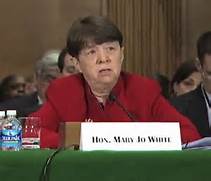Government’s Efforts to Bolster CCOs
 The government recognizes the importance of compliance and Chief Compliance Officers. In a number of recent speeches, the leadership of the Justice Department and the SEC have made important statements supporting corporate compliance programs and the role of chief compliance officers.
The government recognizes the importance of compliance and Chief Compliance Officers. In a number of recent speeches, the leadership of the Justice Department and the SEC have made important statements supporting corporate compliance programs and the role of chief compliance officers.
SEC Commissioner Mary Jo White praised CCOs and the important role that they play in ensuring compliance in an organization (here). Deputy Attorney General Cole reiterated the importance of CCOs and compliance in preventing company misconduct (here). These statements were echoed by SEC’s Co-Director of Enforcement Andrew Ceresney (here), and Associate Director of Enforcement Steven Cohen (here).
These are all welcome comments and support for the compliance profession. The government understands that governance principles inside companies are being readjusted to reflect the risky enforcement environment and the increased role of CCOs. Their statements were calculated to give CCOs a boost.
The comments will have a positive impact on company compliance programs. CCOs are always requesting structural empowerment and additional resources. The government officials’ statements recognized that companies have increased compliance efforts. The government wants companies to continue their efforts to improve and expand compliance programs.
The government is committed to existing enforcement programs and is increasing pressure on companies by dedicating more resources to prosecuting individuals involved in financial crimes, and FCPA and money laundering violations. The government hopes that companies will respond to this threat by arguing for additional compliance resources.
Some have advocated for the creation of a compliance defense as a means to increase corporate compliance spending. Such a proposal, while facially appealing, has a number of practical difficulties. It sounds good in theory but crumbles under scrutiny.
Aside from the practical difficulties in creating a compliance defense, there is no political support – in Congress or in the Administration — to implement such a defense.
It is not clear that companies will respond to the threat of increased individual prosecutions. It is hard to tease out whether the threat of individual prosecutions will have significant marginal impact on corporate decision making when it comes to compliance. Companies may be more inclined to increase compliance under the threat of a government enforcement action which could have a financial impact and, more importantly, of reputational harm.
SEC Chairwoman White argued in a recent speech that large fines provide significant deterrence against corporate wrongdoing. Critics argue that DPAs and NPAs undermine this message of enforcement and companies should be required to please guilty to crimes rather than given deferred or non-prosecution agreements.
 The government’s enforcement message has been consistent; however, the punishments meted out have varied depending on the industry, particularly with respect to financial institutions. Moreover, the government has not provided clarity on the specific benefits that a company can earn through cooperation and self-disclosure.
The government’s enforcement message has been consistent; however, the punishments meted out have varied depending on the industry, particularly with respect to financial institutions. Moreover, the government has not provided clarity on the specific benefits that a company can earn through cooperation and self-disclosure.
For Chief Compliance Officers, the government’s aggressive enforcement program has continued to bolster CCO requests for greater focus on ethics and compliance. The government’s recent statements only confirm what has been occurring for the last ten years.















